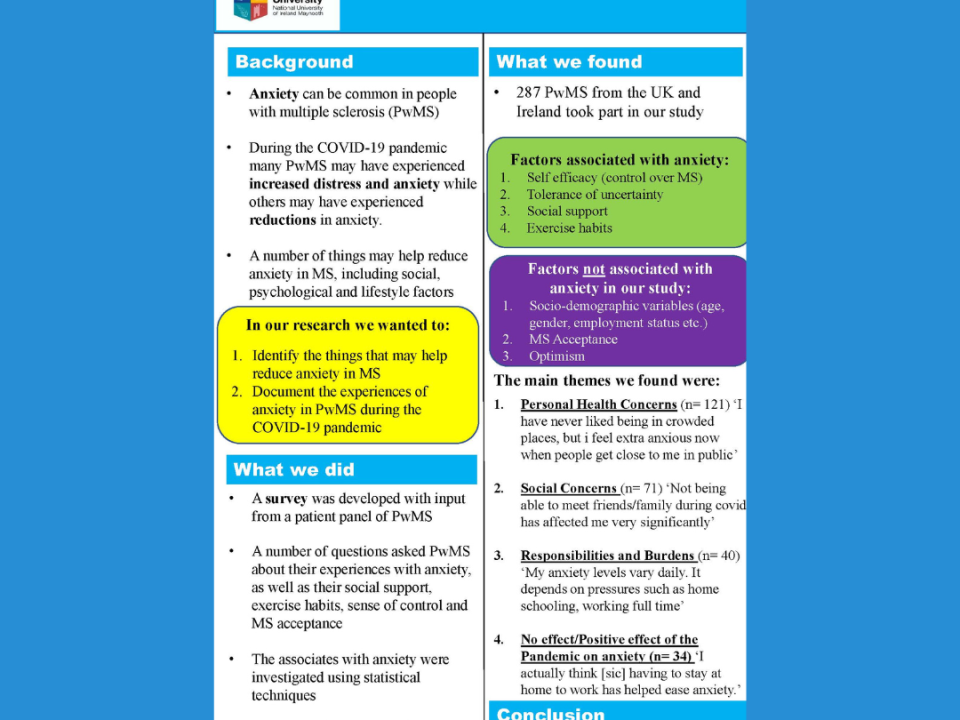The research that I am undertaking as part of my PhD aims to increase understanding of anxiety in MS, both in terms of PwMS’s general experience of anxiety, and experiences of anxiety during Covid-19. We hope that this research will help inform the development of supports for PwMS. As part of this plan, we have completed two studies to date, with a further study planned in the coming months.
Study 1 – A systematic review of the factors affecting anxiety in MS
Firstly, we reviewed recent studies involving anxiety in PwMS which investigated the extent to which anxiety was associated with “modifiable” factors (i.e., factors can be changed). Here we found that lower anxiety was associated with exercise habits, social support, coping, and self-efficacy. For those not familiar, self-efficacy is a combination of how one perceives their own abilities, as well as the control which they feel they have. Ultimately, the greater sense of control one has, the lower the experience of anxiety. Those interested can read the full findings from this study here.
Study 2 – The experiences of anxiety during the Covid-19 pandemic
In order to explore the factors affecting anxiety in MS in more detail, we gathered some data from PwMS living in Ireland and the UK via a survey study. First and foremost, we met with a PPI (Public Patient Involvement) panel who we shared the findings of our review with. For more details on what this involved, see this article on PPI from my supervisor Dr Rebecca Maguire. The PPI panel then helped us create our survey study.
With the help of MS Ireland and UK based groups we received an excellent amount of engagement and feedback when the survey went live, with responses from 287 PwMS. Interestingly, many of the factors we found to associate with anxiety in our review were also found in our sample, namely exercise habits, social support, and self-efficacy. We also found that people’s “intolerance of uncertainty” significantly predicted their anxiety levels.
In addition to the investigation of the factors above, we also asked participants how the COVID-19 pandemic affected their feelings of anxiety, as well exploring the strategies that PwMS use to reduce anxiety. Our findings suggested that the COVID-19 pandemic was an anxiety inducing time for many PwMS (over 50% of participants reported that their anxiety increased as a result of the pandemic).
The biggest reasons given for this were personal health concerns (e.g., concerns related to catching the virus) and social concerns (e.g., lack of social interaction). Many participants reported anxiety from responsibilities and additional burdens (e.g. employment concerns), however some people felt their anxiety reduced (e.g. working from home was seen as beneficial for some).
With this phase of our research complete, we met with our PPI panel again in May to discuss our findings and gain input from patient experts in designing our latest study. We now wish to conduct interviews with a number of PwMS to explore their experiences of anxiety and anxiety reducing behaviours in more depth, as well as to get input on the nature of supports that PwMS would feel is helpful. Currently we are in the process of recruiting participants, with a view to conducting interviews during the summer months. If you are interested in taking part or would like to learn more, please email me at austin.fahy.2015@mumail.ie.

For a summary list of all findings so far in the research click the link below.